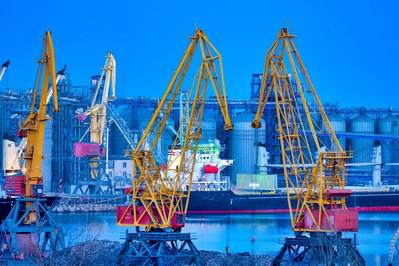What Happens if Russia Abandons UN-backed Grain Corridor?
The Kremlin has said the outlook is "not so great" for extending beyond May 18 a deal that allows the safe wartime export of grain from some Ukrainian Black Sea ports, raising concerns over what happens next with the U.N.-backed sea corridor.
The deal has helped to tackle a global food crisis that U.N. officials said had been worsened by the most deadly war in Europe since World War Two.
Reached in July last year, it created a protected transit corridor to enable exports to resume from three ports in Ukraine, a major producer of grains and oilseeds.
Here are some of the issues:
What has been exported?
Under the pact to create a safe shipping channel, Ukraine has been able to export some 27.7 million tonnes of agricultural products, including 13.9 million tonnes of corn and 7.5 million tonnes of wheat.
This represents about 60% of Ukraine's corn exports in the current 2022/23 season and 56% of wheat exports.
Other commodities shipped include rapeseed, sunflower oil, sunflower meal and barley.
The leading destinations have been China (6.3 million tonnes), Spain (4.8 million) and Turkey (3 million).
Click here for a full breakdown of the countries and quantities exported.
Why might Russia withdraw from the pact?
Russia has said there will be no extension unless the West removes obstacles to the export of Russian grain and fertiliser, including the reconnection of Russian Agricultural Bank (Rosselkhozbank) to the SWIFT payment system.
Other demands include the resumption of supplies of agricultural machinery and parts, lifting restrictions on insurance and reinsurance, the resumption of the Togliatti-Odesa ammonia pipeline and the unblocking of assets and the accounts of Russian companies involved in food and fertiliser exports.
There is little sign of the West agreeing to these demands.
Can the corridor operate without Russia?
Ukraine's ports had been blocked before the agreement was reached in July last year and it is unclear whether it would be possible to ship grain if Russia withdrew.
Insurance rates, which are already high, would be likely to climb and shipowners could prove reluctant to allow their vessels to enter a war zone without Russia's agreement.
Among the risks insurers would need to consider would be the presence of Russian navy ships in Black Sea waters and floating sea mines.
Is the corridor needed if Ukraine's harvest shrinks?
Ukraine's grain exports are forecast to fall in the 2023/24 season after the war has meant farmers planted less corn and wheat.
Favourable growing conditions, however, may limit the extent of the decline.
The International Grains Council has forecast that Ukraine's corn crop will fall to 21 million tonnes, down from the prior season's 27 million, with exports expected to drop to 15 million tonnes from 20.5 million.
Ukraine's wheat production is forecast to fall to 20.2 million tonnes from 25.2 million in 2022/23 and exports to be 11 million versus 14.5 million in the prior season.
Exporting those volumes of grain through the eastern European Union would be both logistically difficult and expensive particularly for crops grown in eastern regions of Ukraine that face a long and difficult journey just to reach the border.
Can Ukraine export more grain through land routes?
Ukraine has been exporting substantial volumes of grain through eastern EU countries since the conflict began, particularly Hungary, Poland and Romania.
There have, however, been many logistical challenges including different rail gauges.
Ukraine's railway network is in 1,520 mm gauge in common with other post-Soviet countries. Countries in the eastern European Union use 1,435 mm gauge, making it impossible to run trains from one network to the other without interruption.
Another issue is that the flow of Ukraine grain through the eastern EU is already causing unrest among farmers in the region who say it has undercut local supplies and been purchased by mills, leaving them without a market for their crops.
Poland temporarily blocked imports of Ukrainian grain last week to mitigate the impact on prices although it said it would still be allowed to transit the country.
Romanian farmers also blocked traffic and border checks with tractors and trucks.
Ukrainian farmers have rejected the claims their exports are reducing profitability elsewhere. The arguments could, however, intensify if Ukraine needed to export a significantly larger volume through eastern Europe.
Has the corridor alleviated the food crisis?
Reduced shipments from major exporter Ukraine have played a role in the global food price crisis.
Other factors include climate extremes and the aftermath of the COVID-19 pandemic.
If the corridor were to be shut down, it would lead to a jump in global prices of grains when many countries already face a steep rise in the cost of imports of food and fuel.
The United Nations World Food Programme said this month food insecurity remains at unprecedented levels.
(Reuters - Reporting by Nigel Hunt and Jonathan Saul; editing by Barbara Lewis)














